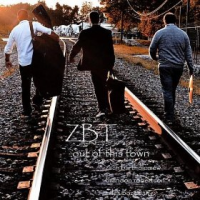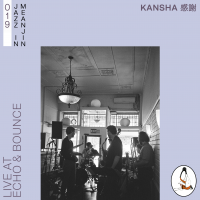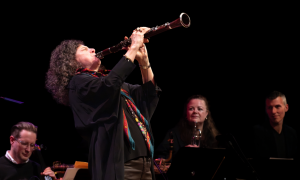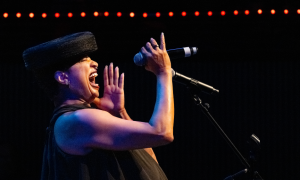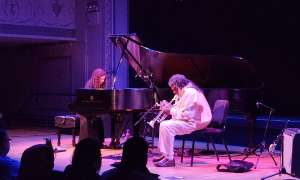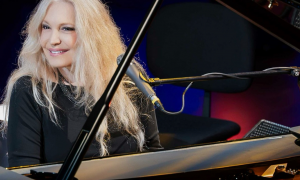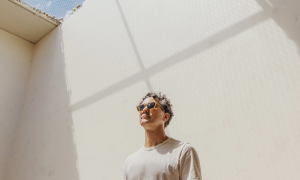Home » Jazz Articles » Live Review » Ruben Blades: Valencia, Spain, July 15, 2012
Ruben Blades: Valencia, Spain, July 15, 2012
Viveros Park
Valencia, Spain
July 15, 2012
Year after year, the iconic Viveros Park hosts a series of varied shows that combine international stars with successful national bands of different styles. The prices remain high, even as the socioeconomic and political situation in Spain becomes increasingly dramatic. Along with guitarist George Benson, Rubén Blades has been the main attraction of the 2012 edition for jazz fans—especially those willing immerse in the orchestral Latin sound that has influenced and dialogued with jazz almost from its start.
After a correct warm-up by Sonora Latina Orchestra, Blades' 12-musician ensemble took the stage as the crowd gathered around expectantly. Blades introduced himself, thanked the audience and dedicated a few words to Spain's unemployment rate. He started off with a relaxed and emotional feeling, and, from then on, the concert continued to grow as he combined energetic dance-oriented tunes like "Decisiones" and "Juan Pachanga" with heartfelt stories like "Pablo Pueblo," "Ojos de Perro Azul" and "Amor y Control." Showing an impressive control of group dynamics, the band created complex polyphonies that merged a powerful rhythmic approach and constant call-and-response vocal and instrumental dialogues.
Perfectly backed by a tight ensemble, Blades performed as a convincing, mature front-man whose presence and credibility was reinforced by the audience fidelity. He conducted a steady, enjoyably paced gig where he superficially addressed social consciousness, world politics and central issues in the understanding of the so-called salsa. Arguing in favor of popular music, Blades rejected his labeling as "intellectual salsa" and described his music as "the neighborhood argument."
In communion with the audience, particularly with the Latin-American community—which occupied at least two-thirds of the total—Blades played most of his celebrated hits, including "Plástico," "Juan Pachanga," the anti-imperialist "Tiburón," and his best-known "Pedro Navaja," where commented on the relationship between music-making and industry producing, by proudly remembering how he was told that "Pedro Navaja," a long and detailed story about a street character who gets murdered, would never be successful.
As the crowd kept dancing, some of the most inspiring moments came during the 15-minute "Muévete," where the musicians' solos were aggressive and emotionally invested. Leaving the bandstand to be in the spotlight, the trumpeter offered some Louis Armstrong/Dizzy Gillespie echoes with a high-note screech of his own. The bass followed with a modern funky-slap sound, and then the timbale and drums liberated themselves with some extensive, strong and sharp hits. Like in a long, improvised jazz tune, the group finally returned with the theme, reaching a final climax where Blades was acclaimed with respect and reverence the day before he turned 64.
Despite an excessive use of the synthesizer that spilled unnecessary layers of chords, the concert demonstrated salsa's musical richness. A non-musical term to basically describe a mix of different rhythmic and melodic Latin-American approaches, salsa is not only connected to its folkloric origins in Cuban son or cumbia, among others, but has also incorporated traditionally black music elements from jazz, disco-soul and funk (the latter most clearly in the intro of "Plástico"). Finally, it is worth noting that Blades' music seems to carry a healing component, which was verbally expressed in the singer's overcoming of difficult situations and dynamically supported by his band.
Overall, Blades and his band offered an intense two-and-a-half hour concert that combined celebratory inspiration with social commentary through life-like accounts, a duality that can also be found in his recorded music. On the one hand, the music gave the audience the direct impact of rhythmic intensity and arrangements; on the other, Blades' popular, poetic lyrics guaranteed not only potential identification, but also the possibility of gradually getting into the viewpoints and messages that flowed across their stories.
Tags
PREVIOUS / NEXT
Support All About Jazz
 All About Jazz has been a pillar of jazz since 1995, championing it as an art form and, more importantly, supporting the musicians who make it. Our enduring commitment has made "AAJ" one of the most culturally important websites of its kind, read by hundreds of thousands of fans, musicians and industry figures every month.
All About Jazz has been a pillar of jazz since 1995, championing it as an art form and, more importantly, supporting the musicians who make it. Our enduring commitment has made "AAJ" one of the most culturally important websites of its kind, read by hundreds of thousands of fans, musicians and industry figures every month.


